The Hero's Journey - Part 1
The Hero's Journey has been studied for thousands of years. This chapter, and the next, are taken from what I've learned from Joseph Campbell's, Hero With A Thousand Faces, as well as The Story Grid, and Take Off Your Pants. You can find these sources in the Appendix page.
There is also a good/slightly different interpretation by the creators of Rick and Morty on You tube:
https://www.inverse.com/article/46665-rick-and-morty-heros-journey-of-anatomy-park
Now for the mono-myth:
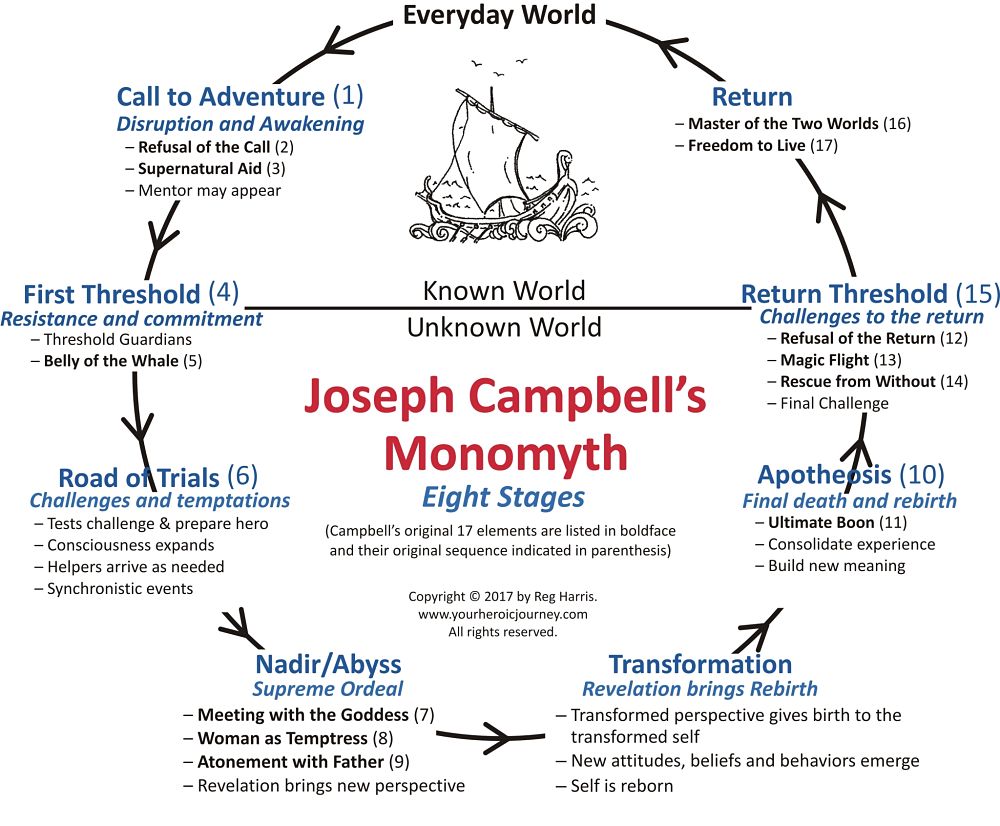
THE CALL TO ADVENTURE

This is the same thing as the inciting incident. It's the action or coincidence which causes the hero's life to go out of wack, thus propelling them on their journey. It can be losing a favorite ball in the woods or being told you're really a wizard.
Or it can be a beautiful princess asking for help.
THE REFUSAL OF THE CALL

"The refusal is essentially the a refusal to give up what one takes to be one's own interest." Joseph Campbell, A Hero With A Thousand Faces.
Now in Harry Potter's case, this is really quite momentary and amounts to him briefly protesting that he really isn't a wizard, until Hagrid makes him think about all the weird stuff he makes happen, and then his aunt tells him his parents were a witch and wizard. But that one "refusal" to acknowledge the truth here amounts to a refusal of the call. Brief, but effective.
In the second hero's journey in the first Harry Potter Book, the inciting incident is the attempted theft of the Philosopher's Stone from Gringots and Dumbledore telling the Students a portion of the third floor is off limits. Harry is intrigued, and wonders what was in the vault, but he doesn't really do anything about it until they accidentally encounter Fluffy, and then must figure out why there is a three-headed dog sitting on a trap door.
In Star Wars: A New Hope, Luke protests that he can't go off helping a beautiful princess when it's the harvest. His aunt and uncle are counting on him. There is no way they would let him go.
Of course Luke's Uncle and Aunt are killed and no only is nothing holding him back, but he now has a personal vendetta against the Empire.
In other books it can go on for a while potentially as a character digs themselves deeper and deeper into refusal until they have to be drug from their world into the other. If so, this should correspond with the later half of the first Act generally.
SUPERNATURAL AID/ MEETING THE MENTOR
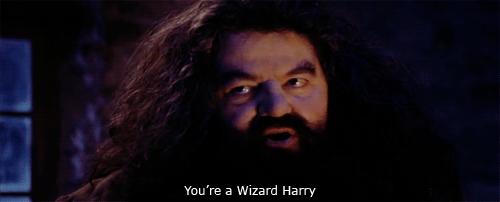
"In so far as the hero's act coincides with that for which his society itself is ready, he seems to ride on the great rhythm of the historical process." Joseph Campbell, Hero With A Thousand Faces
The mentor is a typical character in the Hero's Journey. I'm going to go over the different typical characters in this Monomyth in a later chapter, but the mentor is often someone who has a lot of flaws, but who is generally a good person/being and wants the Hero to succeed.
Examples of mentors/supernatural aid are:
Hagrid/Ron/Hermione/Neville/Pretty much all of his friends in one way or another - Harry Potter
Haymitch - Hunger Games
Effie - Hunger Games
Charlotte - Pride and Prejudice
The three Fairy - Sleeping Beauty
Sebastian - The Little Mermaid
Obi Wan Kenobi - Star Wars
The Fairy God Mother - Cinderella
THE CROSSING OF THE FIRST THRESHOLD (move from Act 1 to Act 2)

The crossing of the first threshold indicates whether a hero is ready or not ready to go on the adventure toward self-actualization. There is often a guardian at the threshold which must be tamed or beaten in some manner. The threshold and the guardian represent the danger beyond the normal world. A hero who is not ready will perish if they attempt to cross the threshold. A hero who is ready, comes with the knowledge of how to subdue the guardian (either through learning or self-growth).
Examples of a threshold guardian in literature or movies are the following:
Both the entrance to Platform 9 3/4 and the Three-headed dog "Fluffy" in Harry Potter and the Philosopher's Stone (all of these books have a journey within a journey in them)

Any bridge Troll/ogre/wizard - like the one in Monty Python and the Holy Grail who gives them riddles.

The Sphinx who eats any person trying to pass without solving the riddles
Haymitch and Effie acts as the mentor figures as well as threshold guardians in a way for the Hunger Games.
Both Coram and Duke Gareth in Alanna The First Adventure can be seen as threshold guardians.
Once the threshold is crossed then the hero must go down into the other realm of "unconsciousness" or otherness where they will face...
THE ROAD OF TRIALS (The Progressive Complications - especially in Act 2)
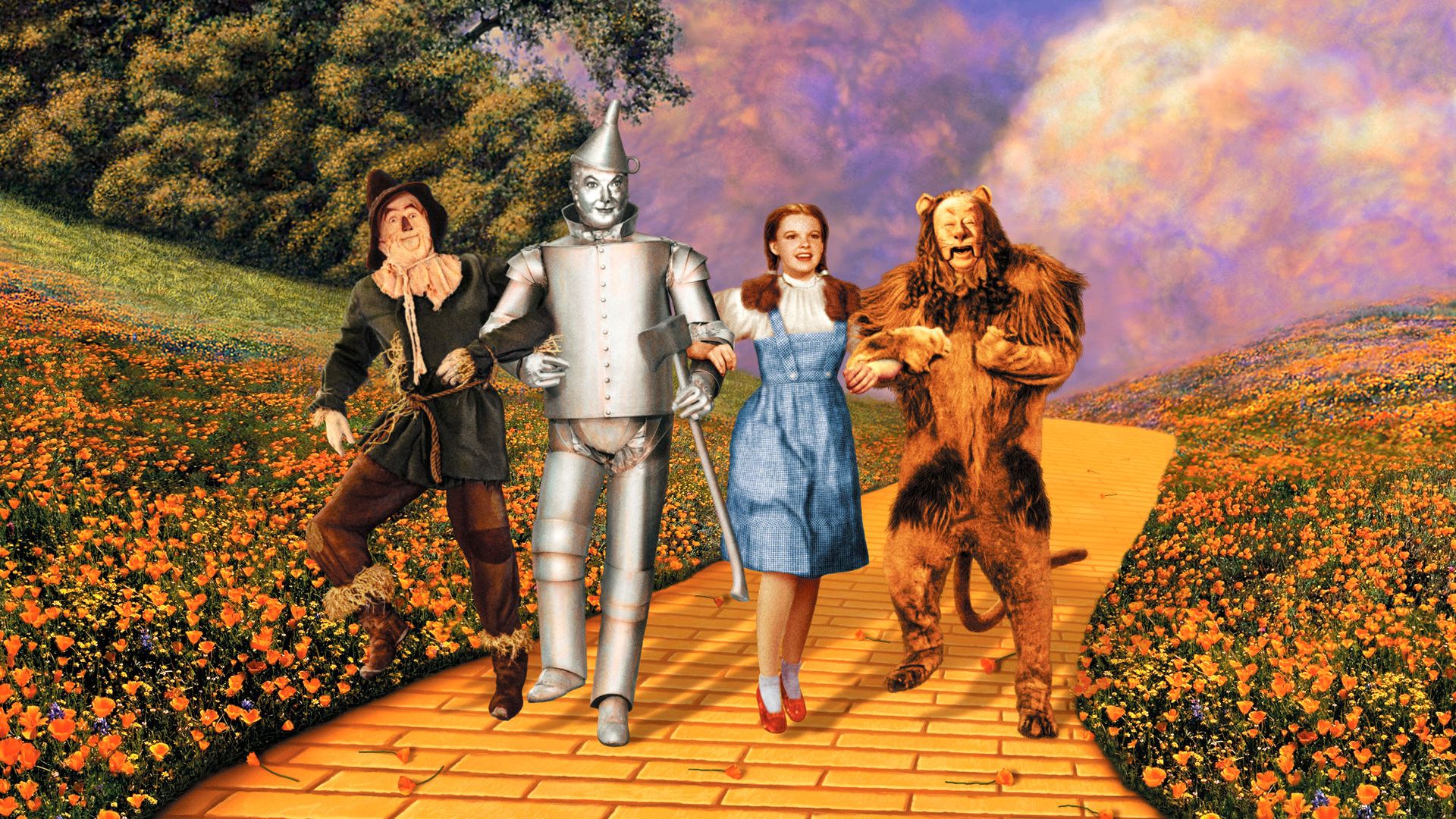
The road of trials is the series of progressive complications which the hero must undertake to achieve his or her goal. Often it involves learning about the self and character development and then applying what is learned to specific "trials."
This might be a series of tests, like in the first Harry Potter Book, - during this stage the students learn all of the necessary magic to get them through the final trials, but also have smaller tests along the way (think the troll, wizard chess, quidditch...)- which take place in a relatively short time span, or it could be trials which span years as a character matures. (The Odyssey) Either way, your MC must be tried after they choose to undertake their journey.
In The Hunger Games these trials are the parts in the arena before the president announces that two children from the same district can win (midpoint). Katniss has successes (killing and not getting killed), and failures (not saving Rue - though she had to die at some point, getting burned, stung by tracker jackers). All of these trials test and develop her character.
In mythology and psychology, the road of trials represents the dismantling of previous conceptions (Katniss coming to understand that it's not the other kids who are the real enemy, but the government, and also understanding how to play the audience to gain favors) which limited the understanding of the hero, and kept them in an "infantile" state. The trials help them see the truth of the universe, and come fully into their powers as enlightened humans. This enlightenment is what helps them overcome whatever their major flaw is.
In Save The Cat, this portion of the story is the "fun and games" portion. (Think the training montage in any 80's martial arts movie)
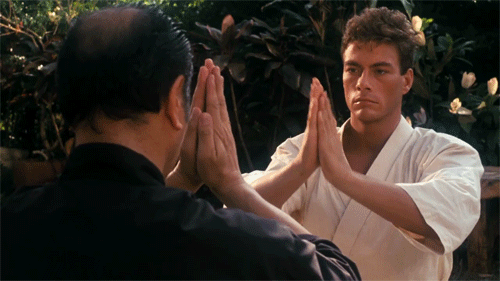
Some "heroes" never reach enlightenment, and they fail in their final test - the meeting with the Divine.
THE MEETING WITH THE DIVINE
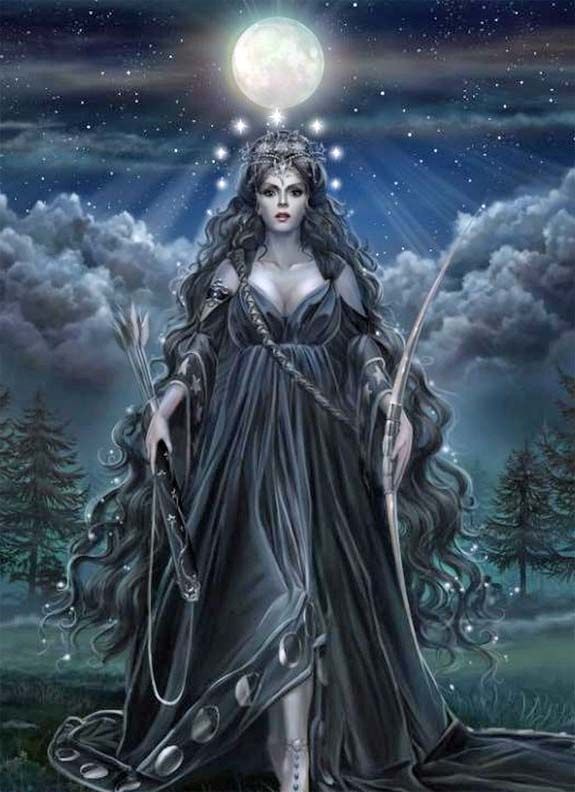
The meeting with the divine is the final trial in the road of trials. This is the make or break moment for the hero. This is where those who haven't reached enlightenment in Greek mythology end up stumbling onto naked goddesses who turn them into stags, or flee from lustful gods and are turned into trees etc. Their inability to overcome their ego/flaw leads to their downfall.
Think of the three brothers from the Harry Potter Tale of the Deathly Hollows:
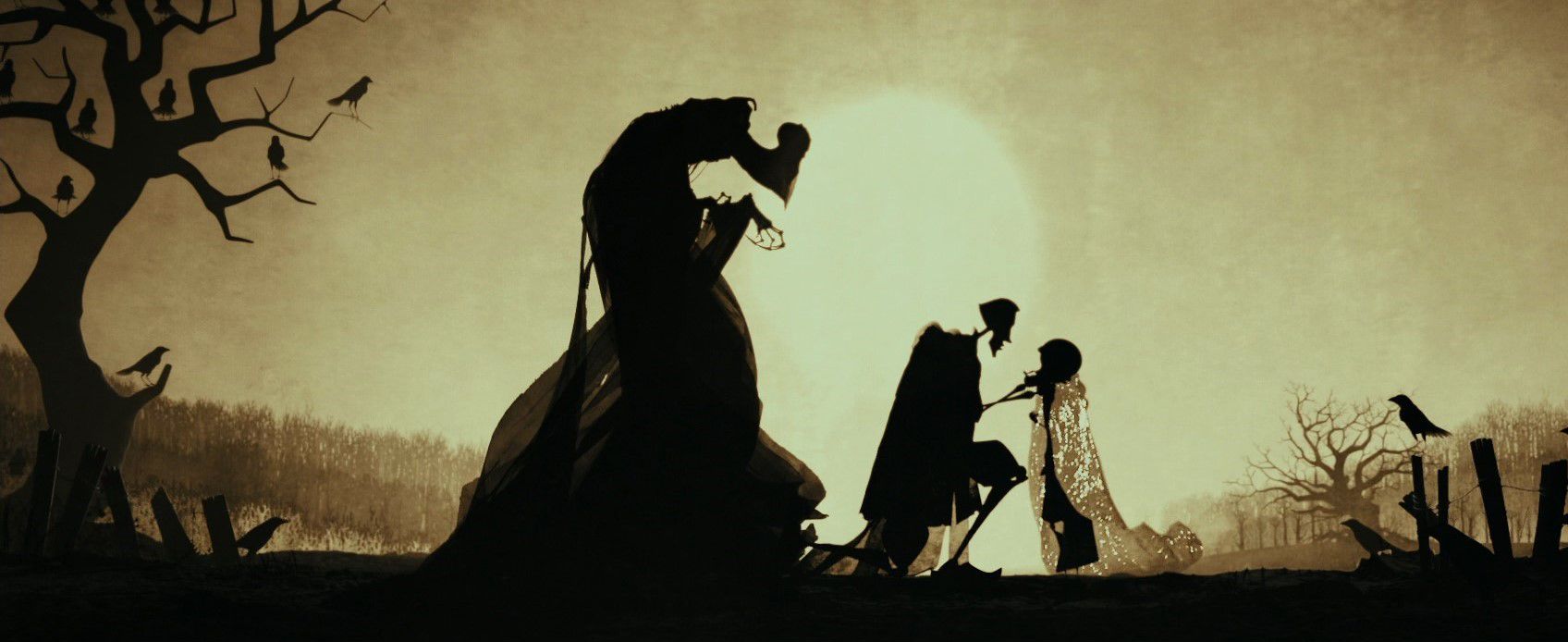
There are three brothers. Death (the divine) wants them for himself, and some tries to trick them into dangerous situations which will cause them to perish. Unfortunately they are advanced wizards and devise spells to overcome these challenges (road of trials/progressive complications).
So Death comes to them (meeting with the divine) and says he will reward them. The first brother, who has not become enlightened, is obsessed with power and his "reward," the most powerful wand in the world, quickly causes his death.
The second brother also perished quickly because his own ego (inability to accept the death of his love) could not be overcome.
The third brother, however, had somehow reached enlightenment by this time and understood that one never escapes death. Thus he asked for the one thing that could prolong his life, Death's invisibility cloak. Eventually he meets Death as an old friend after living a long and fulfilling life.
The third brother passed the test, as did Harry Potter when he went willingly to his own death. Harry meets with the Divine multiple times along his journey, but the pentacle is where he speaks with Dumbledore in the place between life and death.
THE TEMPTATION

The temptation is a necessary part of all hero journeys. This is where the lessons learned through the road of trials are put to their final test.
In Take Off Your Pants, by Libbie Hawker, in her outline this would be the "changed goal" portion. I'll go over her book and outlining techniques in later chapters.
Suffice to say, the temptation portion (which in A Hero With A Thousand Faces is called "Woman As Temptress") is where your hero gets caught and must have help from an ally, or must be sufficiently enlightened to get through it themselves, or perish.

Originally in myth it is often a female who is tempting the male hero - because 99.9% of the heros were men (thanks patriarchy). In hero myths throughout the ages, including modern ones, it's many times a person/god/magical being of the opposite sex, which is designed to draw in the hero through lustful temptation of some sort.
Some of the following great literary temptations are:
The Serpent and then Eve
Satan in The last temptation of Christ
Demons tempting the Buddha
The Sirens of The Odyssey (Sailors tie Odysseus to the mast)
Any female Goddess like Diana/Artemis (known for her virginity - and potentially a lesbian depending on who is asked) who is beautiful but forbidden and who either doesn't want men, or who is there to test them.
Another Goddess figure is the old Crone - the goddess in disguise, who is sent to test the prideful prince (think The Beauty and The Beast)
Mr. Wickham in Pride and Prejudice (he first tempts Lizzy with his stories and then tempts her sister into sin) (Mr. Darcy "saves" them by forcing the marriage- thus proving his love)
Lanfear in The Wheel of Time series
In stories which don't have a romantic/lustful twist, the temptation is often a thing:
The Mirror Of Erised in Harry Potter (book 1) which tempts him to forget his original quest of finding out where the Sorcerers Stone is hidden and who is after it because it shows him his family. (Dumbledore removes the mirror)
The dream Harry has (Voldemort's trick) that Sirius is in trouble in Harry Potter and the Order if the Phoenix (Harry refuses to listen to his friends that it might be a trick and ends up getting Sirius killed, but also forces Voldemort to expose himself in the ministry and learns what the prophesy said - major personal failure, but global silver linings)
The Apple Snow White eats, or the spindle Sleeping Beauty touches (must be rescued by the prince)
The pomegranate which Persephone eats (she doesn't get saved but is forever trapped with Hades for half the year)
Katniss's temptation to hide with Peta until the other kids have killed each other (the capital -enemy - makes stream runs dry to force them out) - The Hunger Games
Frodo's decision to keep the ring/ the One Ring itself in The Return of the King. (First Sam protests, the Golem forces the issue by biting off his finger - thus saving the world)
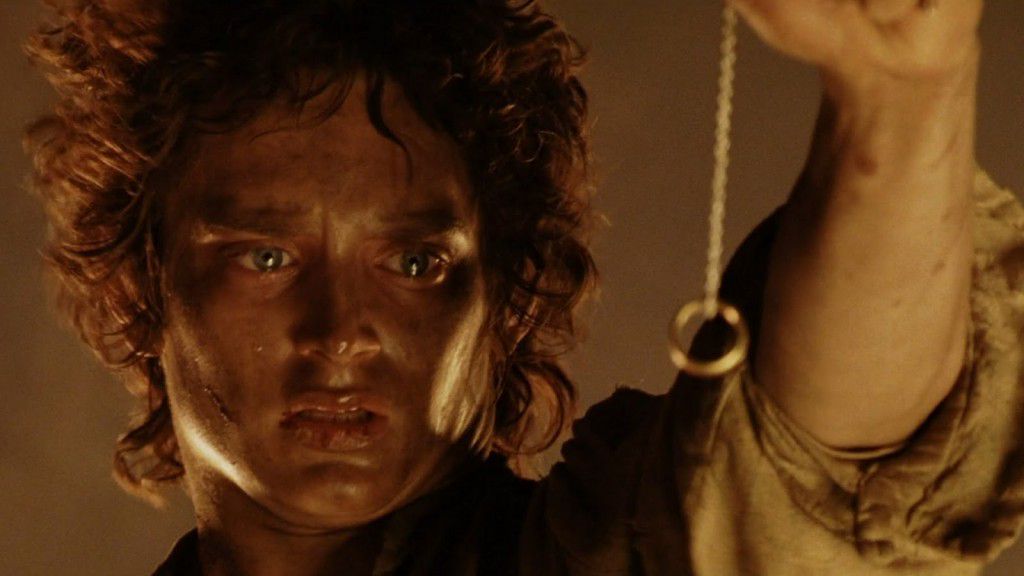
***
The Temptation portion of the story is where an "ally" (whether it's a friend or enemy - both can be ally's at certain times) comes to the rescue or attacks them in a manner of speaking, to force the hero past the temptation. Some heroes don't need this friend, for they are already past the point of temptation (The Buddha), but most are still human at this point and have not transcended past the point of temptation.
Temptation also often corresponds with the Meeting with the Divine - so don't worry about having both of these, they can be the same element.
If your hero is still ripe for temptation, this is a great place to have your ally (or villain) step in to shine. Everyone needs a little help sometimes, even heroes.
Bạn đang đọc truyện trên: AzTruyen.Top